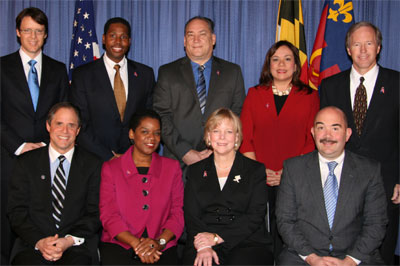
MoCo Council Meets with Senator Mikulski on Feb. 11
The Montgomery County Council will continue its series of informal meetings with federal and state elected officials when it hosts U.S. Senator Barbara Mikulski at noon on Feb. 11 at the Council Office Building in Rockville.
The meeting with Senator Mikulski will follow a 10 a.m. meeting of the Education Committee and a 2 p.m. meeting of the Planning, Housing and Economic Development (PHED) Committee. The PHED Committee will continue to analyze the County’s 2012 Housing Policy and will discuss Bill 40-12 that would provide qualified applicants a “Green Organization Supplement” of up to $25,000.
The Council Office Building is located at 100 Maryland Ave. in Rockville. The two committee meetings will be televised live by County Cable Montgomery (CCM—Cable Channel 6 on Comcast and RCN, Channel 30 on Verizon). The broadcasts will be available via streaming through the county web site at www.montgomerycountymd.gov. The meeting with Senator Mikulski, which will be in the Sixth Floor Conference Room, will be open to the public, but will not be televised live.
The Education Committee, which is chaired by Valerie Ervin and includes Councilmembers Phil Andrews and Craig Rice, will be in the Third Floor Council Conference Room. The focus of the meeting will be a report from a group reviewing relocation and capacity issues related to county school bus depots.
The PHED Committee, which is chaired by Nancy Floreen and includes Councilmembers Marc Elrich and George Leventhal, will address proposed Bill 40-12. The bill is sponsored by Councilmember Roger Berliner and would supplement 50 percent of a recipient’s investment in a qualified “green” organization, or a lower percentage set in the annual operating budget resolution, up to $25,000. The bill would implement one of the recommendations from the Green Economy Task Force.
The county’s Department of Economic Development has suggested that “green product or service” be defined as “a product or service that measures, prevents, limits, minimizes or corrects environmental damage to water, air and soil, as well as problems related to waste, ecosystems, biodiversity, habitat or natural resource depletion.”

Engage us on Facebook
Follow us on Twitter
Tweets by @mymcmedia